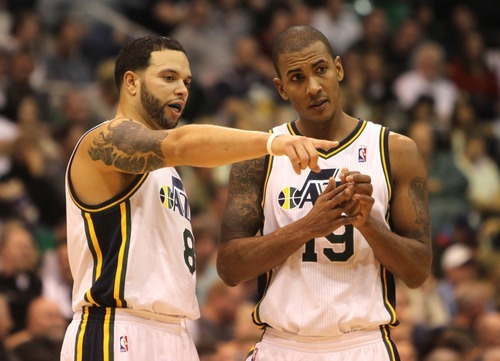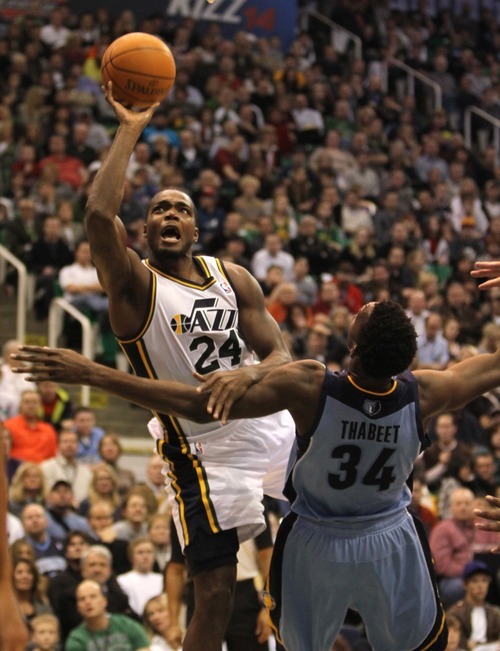This is an archived article that was published on sltrib.com in 2011, and information in the article may be outdated. It is provided only for personal research purposes and may not be reprinted.
The elusive key that will unlock the answer to the Jazz's troubling, season-long trend of starting slow and quickly falling behind has yet to be discovered 34 games into the year.
Buried beneath the constant early deficits that have resulted in numerous thrilling comebacks, though, is another trend. A positive and promising one. One that often separates good teams from great ones, and is defined as much by intangibles and teamwork as an individual statistical performance.
The Jazz have quietly become one of the NBA's premier clubs during the fourth quarter, and Utah is learning how to expertly finish games.
Leading Memphis 71-69 Saturday night after three periods, the Jazz proceeded to outscore the Grizzlies 15-9 in the final five minutes. The output was not an anomaly. Utah is 16-1 this season when holding a lead heading into the final quarter. More impressive: The Jazz rank second out of 30 teams in average fourth-quarter scoring. Utah's 26.5 points trail only high-scoring Phoenix (27. 5) and top third-place San Antonio (26.3), which has the best record in the NBA.
The final stat is impressive and difficult to ignore, and Jazz forward Andrei Kirilenko recited it Sunday prior to practice without being provoked.
It is not that Utah simply puts the ball in the basket, though. The Jazz rank 12th in the league in average scoring, and the team does not have a player ranked in the top 10 in that individual category. However, Utah does have five players — Deron Williams, Paul Millsap, Al Jefferson, C.J. Miles and Kirilenko — averaging at least 11.1 points per game. This, combined with the fact that the Jazz do not have a set second option like some teams — instead relying on a pass-heavy offensive system to eventually find an open shooter — often places Utah in an ideal position when minutes begin to compress and high-percentage shots become crucial.
"I think that's why we're 23-11, is because of our finishes," Williams said. "We've had some bad first halves, first quarters, third quarters. But for the most part we're finishing the game on a high note."
Williams, who ranks 12th in the league in average scoring (22.2), is unquestionably Utah's premier offensive option during the final period. After being substituted for Earl Watson with 7:50 remaining in the fourth quarter against Memphis, he poured in 10 points on 2-of-3 shooting. Williams hit 5 of his 6 free-throw attempts during the span, highlighting his ability to turn his thick, low-center-of-gravity body into a late-game asset as he draws fouls that slow down the clock and ensure that the ball stays out of an opponents' hands.
Williams has been unshakeable at the line all season, shooting a career-high 84.4 percent behind the stripe. But his fourth-quarter prowess is not the only reason that Utah is beating the opposition when it matters most.
Since the Jazz do not have an official second option, they alternately turn to players as diverse as Millsap, Jefferson, Miles, Kirilenko and Gordon Hayward to take key final shots. While Utah was often a two-man show last season, riding Williams and Carlos Boozer to either victory or defeat, the Jazz now have several legitimate options. Moreover, two of the team's current stars — Millsap and Jefferson — rank in the top 50 in the league in field-goal percentage, with Millsap's 55.1 percent accuracy standing tallest at No. 6.
Jefferson's soft-handed offensive game ranges from beneath the basket to 15 feet out, while Millsap often passes up anything outside of 18 feet if he has the ability to pump fake, drive and release, or dish off to a cutting teammate. But as he proved Saturday night, pouring in a team-high 22 points on 8-of-11 shooting, the first-year starter can easily and very quickly become Utah's second option if the role needs to be filled.
"I realize that I have to do that for this team," Millsap said. "Most of the time [opponents are] going to try to get the ball out of Deron's hands, and somebody is going to have to step up. I feel like I'm obligated to do it."
While shot selection is paramount, so are late-game coaching adjustments. Jazz assistant Phil Johnson said that drawing a connection between what has not worked during the first quarter and what works in the fourth is not as simple as it seems. If anything, Utah is reluctant to initially draw offensive fouls, resulting in soft screens and a lack of execution. But when the minutes matter, the Jazz have tightened their focus and streamlined their offensive approach, homing in on sets that have had success and revisiting previously exploited mismatches.
"Essentially the last quarter is when you go to things that have worked," Johnson said. —
Finishing strong
These NBA teams average the most points in the fourth quarter this season:
1 Phoenix 27.5
2 Utah 26.5
3 San Antonio 26.3 —
Career years
Deron Williams • The Jazz guard is shooting a career-high 84.4 percent from the free-throw line this season.
Paul Millsap • The Utah forward is connecting on a career-high 55.1 percent of his field goals, which ranks sixth in the NBA.
Did you know? • The Jazz are 16-1 this season when holding a lead entering the fourth quarter. —
Pistons at Jazz
P At EnergySolutions Arena
Tipoff • 7 p.m.
TV • FSN Utah
Radio • 1320 AM, 1600 AM, 98.7 FM
Records • Pistons 11-22, 23-11
Last meeting • Jazz, 115-104 (March 10)
About the Pistons • Detroit is 1-3 in its past four games, falling 92-75 to Phoenix on the road Friday. … Rodney Stuckey leads the Pistons in average scoring (16.3), while Ben Wallace tops the team in rebounds (6.8). Stuckey did not play against the Suns, though, due to illness. … Detroit ranks 23rd out of 30 teams in scoring (95.4) and 22nd in field-goal percentage (44.9).
About the Jazz • Utah is 2-2 in its past four games. The Jazz were 8-6 in December. … Center Al Jefferson has been held to 24 points and 38 percent shooting from the field during his past two contests. … Guard Raja Bell has knocked down two 3-pointers in three out of his past five games. His six made 3s during the stretch have accounted for 54.5 percent of his made field goals.





